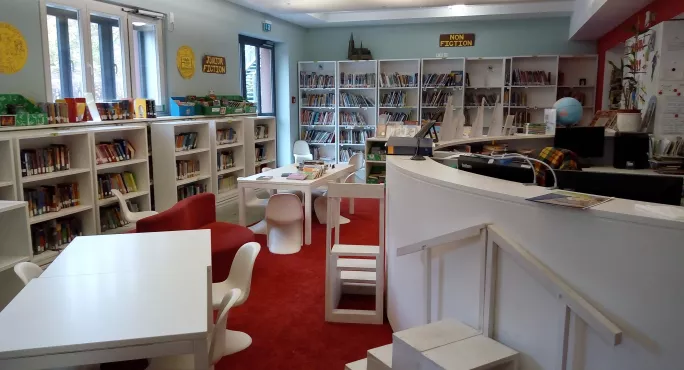- Home
- The importance of a school library during Covid-19
The importance of a school library during Covid-19

School libraries are a wonderful resource - but one that can be overlooked in the hustle and bustle of school life.
Maybe that’s how we like it sometimes, but like everyone at school right now, library staff are rising to the challenge of providing a service that adapts to new restrictions - from remote learning and live-streaming book readings to providing a safe environment when schools reopen.
This is vital not just to maintain school life as normal as possible but for librarians to maintain a sense of the purpose and importance of their role within school life.
Coronavirus: Library book drop-offs and buying ebooks
At the Berlin Brandenburg International School, we have, like the majority of international school libraries in Europe, remained open to support children of key workers - while following new limitations that have required some significant changes.
For example, we have formulated a drop-off book collection service for parents so children can continue to access new books.
This has meant we have been engaging with our security and reception teams a lot more in order to help process these handovers to parents.
Parents and students can check their own library account online using the Destiny Quest app, including renewing and reserving titles, and we have also been posting books to those who are unable to physically visit the school.
We have also expanded our ebook catalogue by 40 per cent (purchasing multi-user licences for the most popular books).
We did this as we knew that with more studying taking place online, we would need more ebooks. However, ebooks are generally as expensive as physical books, if not more, while our budget did not increase.
While ebooks are great for avoiding issues of contact with items, there are some shortcomings. For example, the language options in purchasing ebooks are limited to key languages.
For example, we did not buy any ebooks in Korean or Hebrew (we have many students who speak these languages), which was a pity and something we will work to address.
Keeping books clean
We are also, like the majority of international school libraries, abiding by the following guidelines: returned books to be quarantined for a minimum of 72 hours to one week (in an area not in the library) while all books and resources (scientific calculators and DVDs, for instance) have to be wiped clean with disinfectant.
For staff, rules include using gloves and face masks, allowing 1.5-metre distancing between staff or pupils by readapting furniture and fittings, fitting plexiglas shields for the circulation desk (optional) and not allowing more than five people to be admitted at once (as per pro-ratio).
Excellent guidelines have already been published by IFLA and CILIP UK, and informal advice and strategies are often shared by librarian support network groups such as the Facebook group Future Ready Librarians and the recently formed International School Librarian Roundtable.
Avoiding legal issues
Interestingly, the assumption that any story can be read aloud and posted online is untrue, as many authors and publishers are still upholding strict copyright laws, on the grounds that posts are “temporary”.
The reality is that most live-streaming events shared on social media platforms are limited to just 24 hours.
Furthermore, mainstream publishers like Disney ask the reader to “please note at the beginning of the video that you are reading with permission from Disney Publishing Worldwide”, and to post only through your “school’s private platform”.
No doubt a few librarians have helped teachers to avoid falling foul of some of these rules.
Lines of communication
What’s more, library staff are also having to adapt to the embracing of new communication technologies to aid staff and students alike, with email, video and telephone call requests for information or help in finding key resources now commonplace.
Indeed, we have seen a clear increase in students’ grasp of databases and new research sites due to the increase in enquiries and requests forwarded on by teachers.
We are also working more closely than ever before with edtech providers and curriculum coordinators to offer assistance to colleagues unfamiliar with online learning through tasks such as tracking reading levels, recommending literature for reluctant readers and assisting EAL (English as an additional language) students with foreign language resources.
The power of libraries
For many students and staff, the library exists as a space to reset and recharge, to provide a break from the demands of school, and offers the luxury of serendipity, imagination and idleness.
Tellingly, this pandemic has highlighted the fact that the relationship between student and librarian revolves around far more than accessing information or reading for pleasure.
Our team is working tirelessly to deliver effective library services during Covid-19. Hopefully, the importance of a school library will never be overlooked again.
Graeme Boyd is learning resource specialist at Berlin Brandenburg International School
Keep reading for just £1 per month
You've reached your limit of free articles this month. Subscribe for £1 per month for three months and get:
- Unlimited access to all Tes magazine content
- Exclusive subscriber-only stories
- Award-winning email newsletters